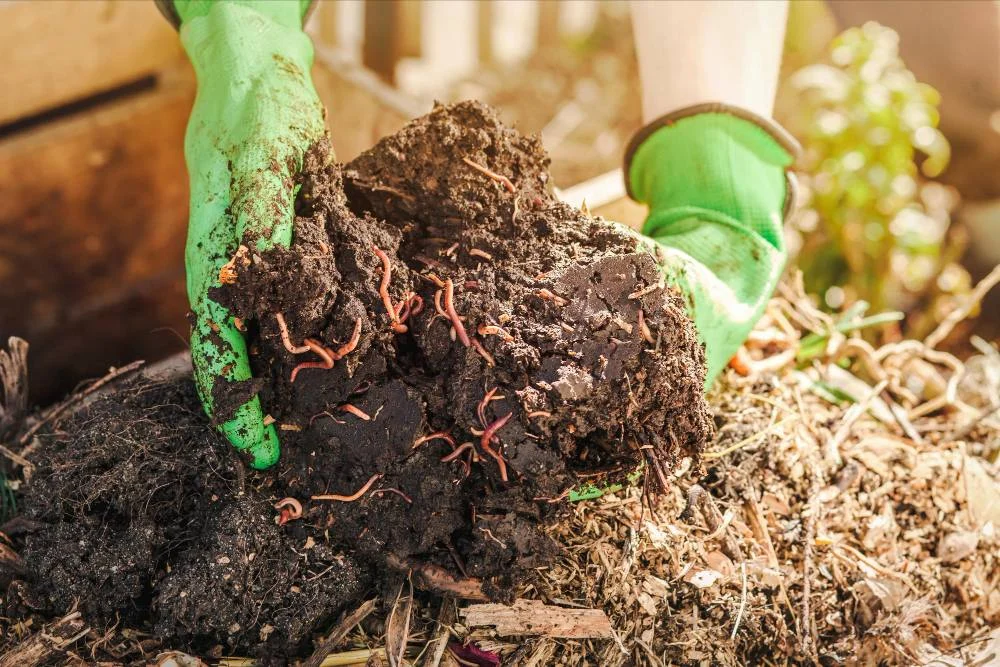Give your garden the boost it deserves with compost! Compost is like a superhero for plant growth, providing essential nutrients and improving soil health. In short, it’s the secret ingredient to lush, thriving gardens.
So, what are the plant growth benefits of compost in soil? Compost balances the soil’s pH level, prevents particular weeds from growing, improves water retention, and reduces the need for chemical fertilizers. Furthermore, it prevents your plants from catching any diseases and encourages the growth of microorganisms.
However, there are certainly more questions jogging in your head. For example, how does compost work in the first place? Furthermore, what compost should you use for your specific plant? I will answer all your questions, but let’s start with the basic one.
What is Compost?
Imagine you’re surrounded by colorful flowers and lush vegetables in your garden. But what’s the secret behind such a flourishing garden? For many gardeners and myself, the answer lies in compost.
Let me explain what compost is In the simplest terms. Compost is like gold for your garden. It’s made from old food scraps, leaves, and other natural stuff. When you mix them, let them sit for a while. As a result, they become a special kind of soil full of nutrients.
It’s like nature’s way of recycling. They take old plant stuff and turn it into food for new plants.
How Does Compost Work To Support Plant Growth?
Creating compost is like cooking, but you’re letting nature do the work instead of following a recipe. You combine vegetable peels, eggshells, leaves, and grass clippings. Afterward, throw them into a compost bin. Then, with a bit of time and patience, the magic happens.
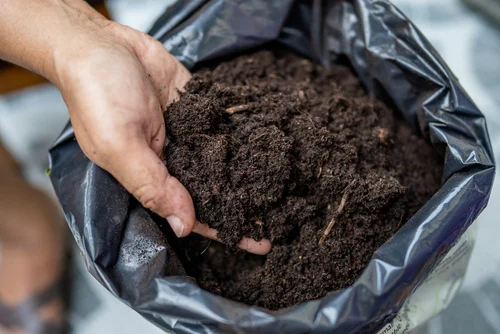
Microorganisms like bacteria, fungi, and worms get to work breaking down the organic matter. As they chew away, they transform it into a nutrient-rich material that gardeners call “black gold.
Overall, it’s a process that has been happening in nature for ages. However, composting can speed it up and benefit your garden.
Plant Growth Benefits of Compost in Soil
Whether you are a beginner or a pro at gardening, you should know that not all soils are created equal. Sometimes, they need a little boost to reach their full potential. This is where compost comes in. Let’s check out how compost in soil encourages plant growth.
Balances pH
For me, compost is like a superhero, and one of its superpowers is balancing pH. PH might sound complicated, but it measures how acidic or alkaline your soil is. Some plants like it more acidic, while others prefer it more alkaline.
When you add compost to your soil, it acts like a pH balancer. If your soil is too acidic, the compost can help make it more neutral. On the other hand, if it’s too alkaline, the compost can reverse it back toward the middle.
Well, how do they do it? Compost contains natural acids and bases that can adjust the pH gradually over time.
Prevents Certain Weeds
As you should already know, certain weeds in your garden shouldn’t be there. Furthermore, they can take up the nutrients from your plants. Fortunately, compost can help you here as well.
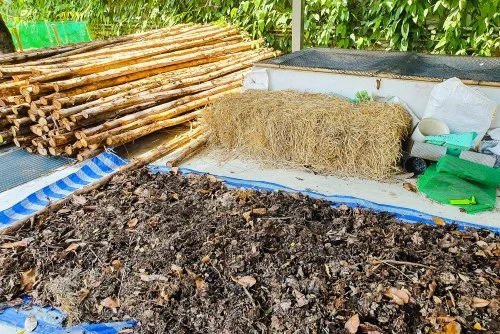
When you spread compost over your soil, it creates a thick layer that makes it hard for weed seeds to get the sunlight. Additionally, it blocks the oxygen they need to grow.
But that’s not all. Compost also contains beneficial microorganisms that can fight with weed roots for space and nutrients. These tiny organisms create a healthier environment in your soil that’s more advantageous to your plants than weeds.
Improved Water Retention
Compost is like nature’s sponge when retaining water in your soil. Mixing compost into your garden beds creates a spongy, porous structure that can hold onto moisture like a champ.
Think of it this way: instead of water just running off the surface of your soil when you water your plants, the compost absorbs it like a sponge.
Then, when the soil starts to dry out, the compost releases the moisture stored back into the soil. As a result, your plants stay moist.
This is an excellent time and effort saver for me. You won’t have to water your garden as often, saving time and effort and conserving water. Plants love a consistent water supply, so they’ll be happier and healthier with compost.
Reduced Need for Chemical Fertilizers
Compost is packed with nutrients that plants in your garden love, like nitrogen, phosphorus, and potassium. When you incorporate compost into your soil, these nutrients become available to your plants when required.
This is the opposite of other chemical fertilizers. While chemical fertilizers can be washed away by rain, compost nutrients can’t. As a result, compost can provide a steady supply to your plants.
This means you won’t have to apply chemical fertilizers as frequently to keep your plants healthy.
Disease Suppression
Another remarkable advantage of utilizing compost is disease control. I can’t explain how much helpful it was for my garden. Compost is full of beneficial microorganisms. This includes bacteria and fungi that fight with harmful pathogens for space and resources in the soil.
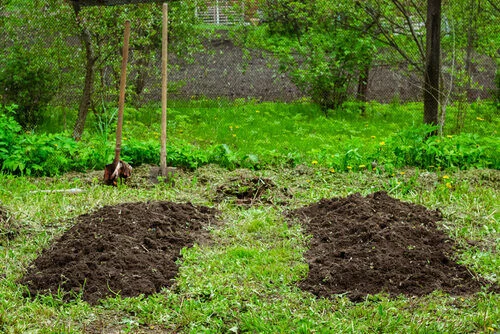
When you add compost to your garden, these good microbes multiply, creating a natural defense against plant diseases.
Additionally, the organic matter in compost boosts the growth of plants’ natural defense mechanisms. As a result, it makes them more resistant to diseases and pests.
Encourages Earthworms and Soil Microorganisms
Earthworms love compost. When you add compost to your soil, you provide earthworms with organic matter to munch on.
As they move down, they tunnel through the soil, aerating it and improving its structure. This creates pathways for air, water, and nutrients to reach plant roots, making for healthier, happier plants.
Types of Compost: When to Use What Compost
There are different types of compost available for your plant growth. Thus, choosing the best one for your specific plant can get tricky. Let’s check out a table that will make the decision-making process more manageable.
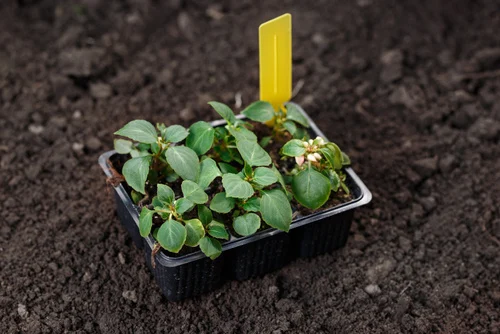
| Type of Compost | When to Use It |
| Manure Compost | Use when nitrogen is needed, such as for leafy greens or plants in their early growth stages |
| Leaf Compost | Ideal for mulching around trees, shrubs, and perennial plants |
| Kitchen Compost | Best for adding nutrients to vegetable gardens and annual flowers |
| Green Compost | Use when nitrogen is needed, such as for fast-growing vegetables or plants with high nutrient demands |
| Brown Compost | Suitable for improving soil structure and retaining moisture in all types of gardens |
| Worm Compost | It is excellent for all types of plants, especially those that benefit from a steady supply of nutrients |
| Composted Yard Waste | Great for improving soil fertility and structure of all kinds of gardens |
| Mushroom Compost | Use for improving soil structure and adding nutrients to garden beds |
Finale
Compost is the ultimate solution for promoting healthy plant growth and a thriving garden ecosystem. Its nutrient-rich composition and capacity to enhance soil structure, retain moisture, suppress weeds, and prevent diseases make it an invaluable asset for gardeners of all levels.
By incorporating compost into your gardening routine, you’re nourishing your plants and nurturing the health of the soil and the environment. So what are you waiting for? Go ahead and add compost to your garden’s soil.

